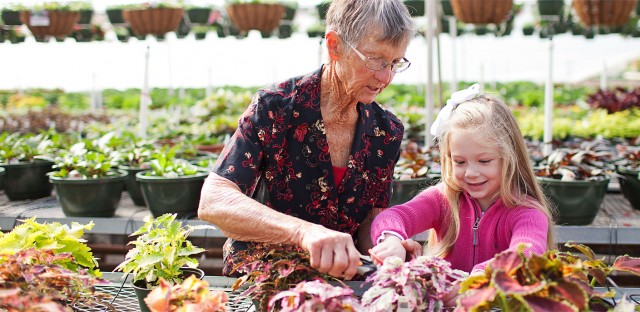Easy Edibles for the Landscape
 Trees and shrubs can provide more than just shade and style in your yard. Your refrigerator’s produce compartment won’t host any fruit more fresh than that harvested from your own garden. The fresher the produce, the greater the health benefits as less vitamins and minerals have leached away over time. Think outside the raised garden bed! Edible trees, shrubs and perennials can be just as rewarding as traditional annual veggie garden selections.
Trees and shrubs can provide more than just shade and style in your yard. Your refrigerator’s produce compartment won’t host any fruit more fresh than that harvested from your own garden. The fresher the produce, the greater the health benefits as less vitamins and minerals have leached away over time. Think outside the raised garden bed! Edible trees, shrubs and perennials can be just as rewarding as traditional annual veggie garden selections.
Certain varieties of strawberries are very easy to grow and can be used to introduce children to gardening. They are self spreading, evergreen, and very tolerant of many soil and light conditions. Of course, most strawberry plants do best in full sun and moist soil but plants can produce in partly shady spots as well.


At Fairview, we grow Everbearer varieties which produces small, juicy, delicious berries. Everbearer strawberriesare easy to grow in our climate. They can produce a high yield of fruit and can even thrive in containers for those with limited growing space. Strawberries are an easy plant to get you on the road to homegrown produce. A successful crop will inspire you to branch out into other edibles as well.
Blueberries are another easy and beautiful addition to the edible landscape. Varieties are available in small shrub form or tall growing, fruit producing monsters. All blueberries produce best when a few shrubs are planted together for cross pollination.

There are 2 main types of blueberries that grow easily in our area, Rabbiteye and Highbush. Rabbiteye are the easiest to grow as they do not require raised beds. Premier, Climax and Tifblue are popular and low maintenance varieties of Rabbiteye blueberries that produce high yielding crops. O’neal is a showstopping variety of highbush blueberry that produces huge, very sweet berries very early in the season. What an O’neal lacks in yield, it makes up for in size and flavor. All blueberry plants prefer well drained, high acidity soils mixed with organic material.

A simple addition of Holly Tone and pine bark mulch will provide plenty in the way of acidity. Once established, the plants can produce pounds of berries each season. Bird netting is recommended for young crops if you want to have any for yourself. Most varieties of blueberries produce fruit in early June through early August and make a nice addition to your morning bowl of cereal after your strawberry crop is finished producing.
Muscadine Grapes, Raspberries and Blackberries can be easy to grow and harvest too. Muscadine grapes are native to North Carolina and produce large, very sweet fruits with a thick skin in late summer and early fall. Muscadines can be a great addition to a backyard trellis in full sun or trained on a stand alone grape vine. There are also many new varieties of thornless blackberries and dwarf trailing raspberries that would be a great addition to a patio. Raspberry Shortcake is a new Brazel Berry introduction that has a compact, rounded growth habit and does great in a container.
Fruit trees are the final element of an edible landscape. Fruit trees come in all sorts of shapes, sizes and flavors while having some of the most beautiful spring flower displays. Some fruit trees need companions for cross pollination, while many do not. Here is a general list when considering purchasing a pollinator or companion plant:
- Fig Trees – Do not need a pollinator
- Pear Trees – Do not need a pollinator
- Peach Trees – Do not need a pollinator but 2 different culitvars are best.
- Apple Trees – Need a pollinator. Mix any 2.
- Blueberries – Have a heavier fruit set when paired with other cultivars but do not require a pollinator.
Some fruit trees are slightly more challenging to grow as many bugs, birds, and animals are also fond of fresh fruit. There are many selections, however, that can be quite easy and rewarding. If you are a fruit tree growing newbie, consider a Brown Turkey Fig to start as they are relatively pest and disease resistant, don’t require much pruning and can have heavy fruit sets in mid to late summer.




